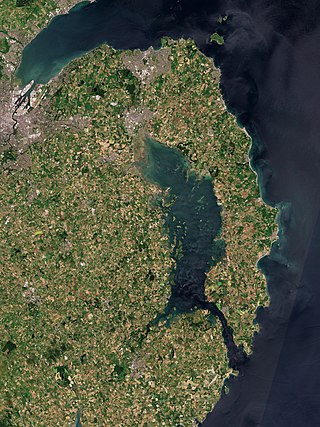
Strangford Lough is a large sea lough or inlet in County Down, in the east of Northern Ireland. It is the largest inlet in Ireland and the wider British Isles, covering 150 km2 (58 sq mi). The lough is almost fully enclosed by the Ards Peninsula and is linked to the Irish Sea by a long narrow channel at its southeastern edge. The main body of the lough has at least seventy islands along with many islets (pladdies), bays, coves, headlands and mudflats. Historically it was called 'Lough Coan', while 'Strangford' referred to the narrow sea channel. It is part of the 'Strangford and Lecale' Area of Outstanding Natural Beauty. Strangford Lough was designated as Northern Ireland's first Marine Conservation Zone in 2013, and has been designated a Special Area of Conservation for its important wildlife.
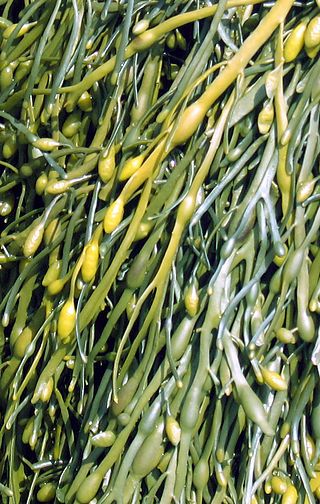
Ascophyllum nodosum is a large, common cold water seaweed or brown alga (Phaeophyceae) in the family Fucaceae, being the only species in the genus Ascophyllum. It is a seaweed that grows only in the northern Atlantic Ocean, also known in localities as feamainn bhuí, rockweed, Norwegian kelp, knotted kelp, knotted wrack or egg wrack. It is common on the north-western coast of Europe including east Greenland and the north-eastern coast of North America, its range further south of these latitudes being limited by warmer ocean waters.

The Battle of Fort Ontario was a partially successful British raid on Fort Ontario and the village of Oswego, New York on May 6, 1814 during the War of 1812.

Armina is a genus of sea slugs, specifically nudibranchs, marine gastropod mollusks in the family Arminidae.

Ranella olearium, common name the wandering triton or the little frog triton or olive trumpet, is a species of large sea snail, a marine gastropod mollusc in the family Ranellidae, the tritons.

Tethydidae is a family of dendronotid nudibranch gastropod mollusks in the superfamily Tritonioidea.

Phidiana is a genus of sea slugs, aeolid nudibranchs, marine gastropod molluscs in the family Facelinidae.

Burnupena papyracea, common name the papery burnupena, is a species of sea snail, a marine gastropod mollusk in the family Buccinidae, the true whelks.
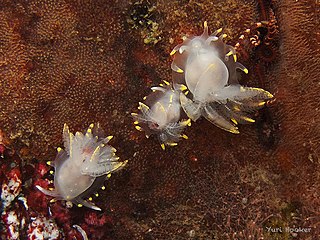
Okenia luna is a species of sea slug, specifically a dorid nudibranch, a marine gastropod mollusc in the family Goniodorididae.

Alcyonidium is a genus of bryozoans in the order Ctenostomatida.
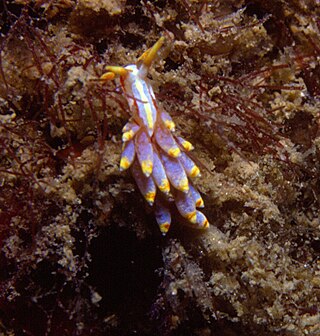
Trinchesia genovae is a species of sea slug, an aeolid nudibranch, a marine gastropod mollusc in the family Trinchesiidae.

Stomachetosella is a genus of marine, filter-feeding invertebrates, known as bryozoa, belonging to the order Cheilostomatida. The genus name derives from the Latin stoma, meaning "mouth," and ochetos, meaning "small canal."
Beania is a genus of bryozoans belonging to the family Beaniidae.
Rhabdozoum is a genus of bryozoans belonging to the monotypic family Rhabdozoidae.

Parvicardium is a genus of bivalves belonging to the subfamily Lymnocardiinae of the family Cardiidae.
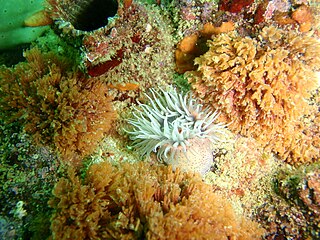
Bicellariella is a genus of bryozoans belonging to the family Bugulidae.
Cribrilina is a genus of bryozoans belonging to the family Cribrilinidae.
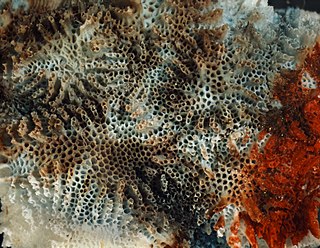
Lichenopora is a genus of bryozoans belonging to the family Lichenoporidae.
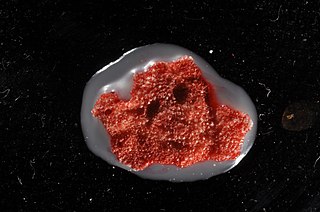
Rhynchozoon is a genus of bryozoans belonging to the family Phidoloporidae.















